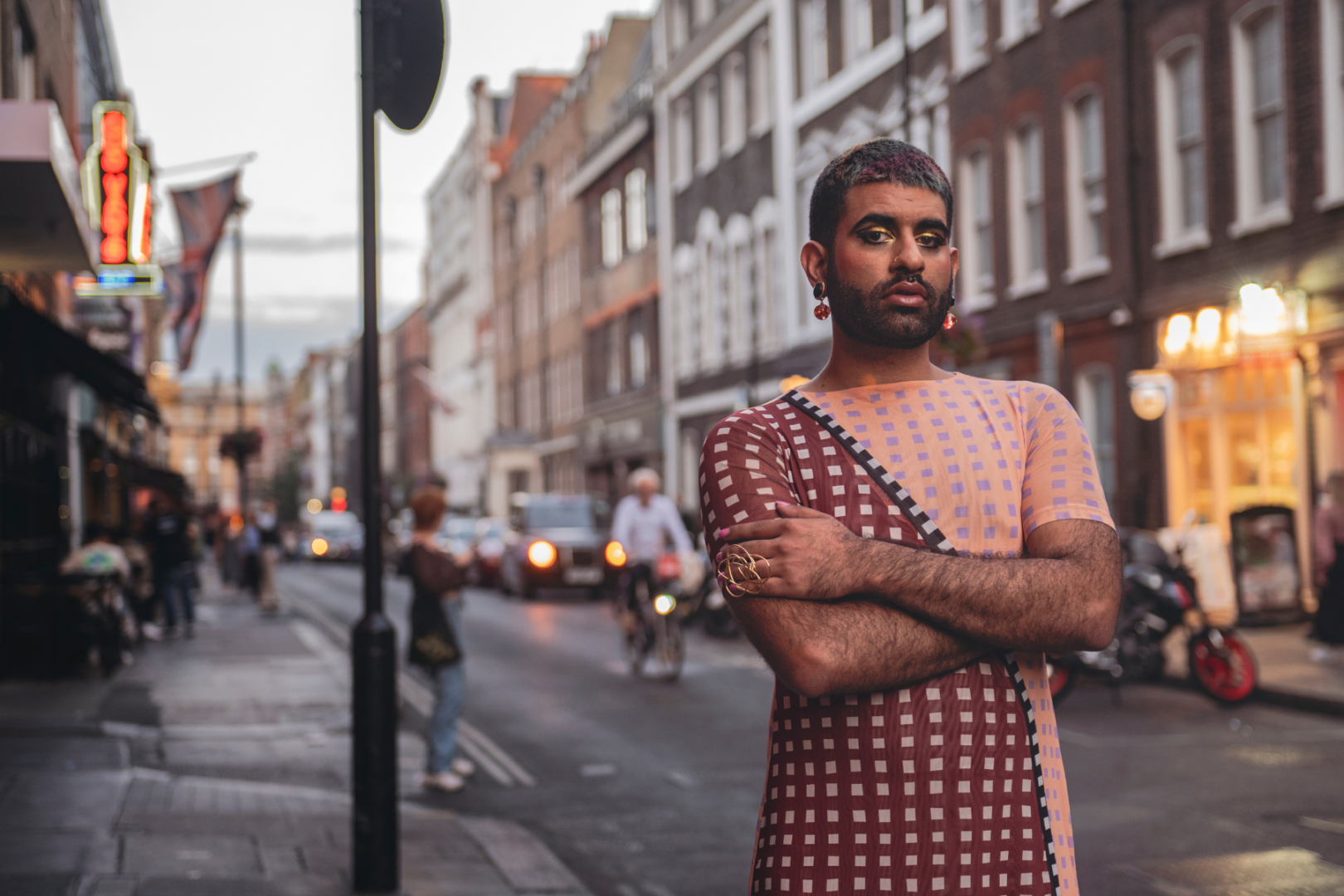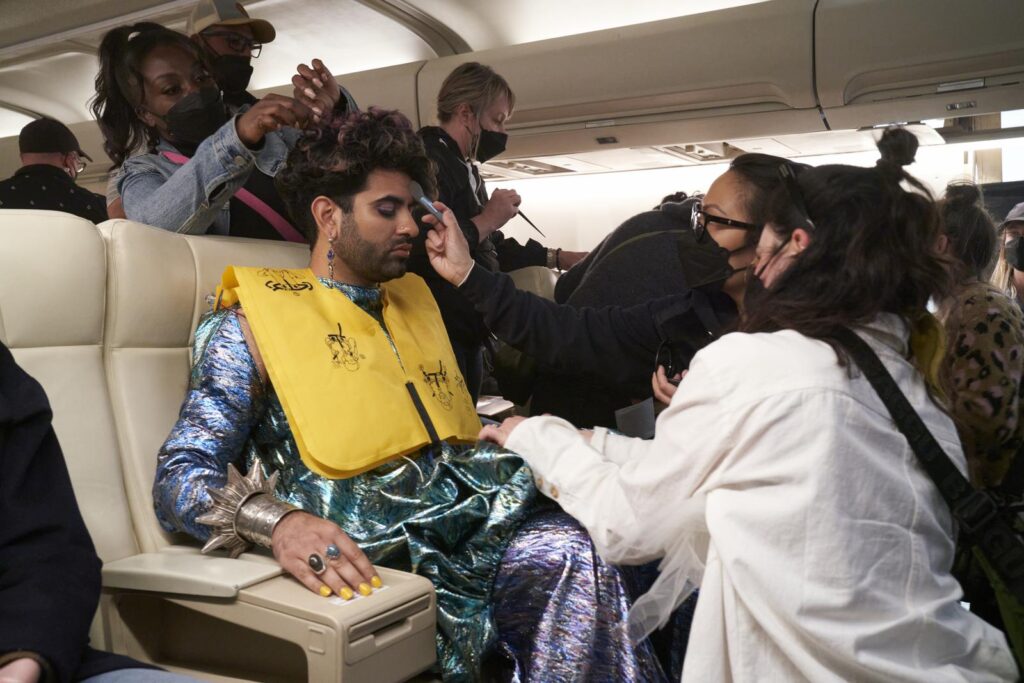
Peabody Award-winning series “Sort Of” has captivated audiences with its ambitious but understated take on gender fluidity and identity right from the very first episode. It was only then apt for such a groundbreaking series to end on a high note — with a cameo from the gender non-conforming writer, artist, changemaker and fashion icon Alok Vaid-Menon.
[Read Related: We Cannot be Erased: Bilal Baig Talks Season Finale of Sort Of]
In an exclusive conversation with Brown Girl Magazine, Menon shared how just seeing Bilal Baig play Sabi — a South Asian and gender non-conforming individual — on-screen walking, smiling, and chatting with their friends made them feel represented and so they wanted to help the show out in any way possible.
Menon recently met Baig in New York on the sidelines of the show and hit it off right away.
“We met up for pizza and went out dancing. It just felt so emotional; to have a peer. I often feel like I’m the only one in so many rooms. I’m often one of the only openly trans feminine people, and meeting Bilal has given me so much. It’s such an emotional feeling to be able to connect with someone who gets your frame of reference and who gets your point of view and to be able to celebrate one another.”
Below are some excerpts from our conversation:
You appear in a cameo in “Sort Of.” What can you tell us about your character in the show?
I don’t want to give too much away, but I’m in a dreamscape scene where Sabi sees a vision of me. We have this meaningful gaze with one another. I’ve been such a fan of the show for so long. I got the opportunity to celebrate the beginning of season two at the Toronto Just for Laughs Festival in 2022, where I met Bilal and connected with all the cast. I told them at that point if there’s ever anything that I could do to help out with the show, let me know. They came back for season three, and said, “Hey, you want to make this cameo?” And I said, “Absolutely!”
I think it’s one of the most important shows that we have for South Asian representation so I was very excited to do it.

You mentioned that you’ve developed a unique bond; a friendship with Bilal. Can you tell us more about that?
I give them pep talks, and they give me pep talks. And it hits different. Maybe it’s more an internalized thing, but when I get compliments from other people I don’t necessarily believe them. But when I get compliments from someone who gets me so well, I’m like, “Wow, I’m doing something important, this is something meaningful.” I feel a part of something greater than myself. So “Sort Of” has had that kind of personal impact on me of giving me someone who I can actually relate to on such a fundamental level.
I know how that’s changed my life. I think there’s a battle that many of us as gender non-conforming people experience. Is it going to be too painful? Will there be too much retribution and violence where we can’t continue to be ourselves, but then there’s embodied hope, and that looks like friendship. And that looks like representation.
So my hope is that the scene that we’ve done together communicates all those deeper feelings. When you’re feeling despair, loneliness, and impossibility, you have two choices. You can sort of sequester yourself from the world and wallow in it. Or you can use that pain as a catalyst for intimacy and connection, and try to seek other people to be seen and to be witnessed alongside. And I think our scene really illustrates that concept.
How do you relate to Sabi’s character on a personal level?
Growing up as a South Asian diasporic person, I was very much made to feel like the more I asserted my individuality, the more I was betraying my family and my culture. So there is this kind of internal aggression, of knowing that the more I express myself, the more potentially estranged I would become from my friends and my own family. I think that’s really explored throughout “Sort Of.” Sabi trying to do that delicate dance that so many of us have grown to know; trafficking between worlds that feel incompatible or impossible. Those are the scenes that are the most meaningful to me. Those moments of intimate self-censorship where you take off an earring or wipe off your eyeliner when you’re going to go visit your grandparents. It feels so loaded: “Is the only way that you’re gonna love me if I look a certain way.” Seeing somebody navigate those weavings of worlds is really powerful. It illustrates the pain a lot of us feel.
Also what I like about Sabi’s character is that they’re weird, and alternative. One of the plots that’s “Sort Of” explored in season two and season three is Sabi suddenly deciding if they want to go to Berlin. There’s this deep emphasis on counterculture, nightlife and queer performance, and queer coffee shops. Those are so many integral experiences to my life. I was made to feel like I had to be very straight-laced. The narrative I was told growing up was, “Don’t draw more attention to yourself. So, don’t do anything that will make people look.” But Sabi is basically like, “F**k it! I’m going to be me and you can look at me!” And that’s so world opening for so many of us.
View this post on Instagram
Do you feel this show is a first of its kind to explore Sabi’s journey the way it does as well as their connection to others?
Whenever people ask me about what I want to see in the media, I point to “Sort Of” because I think it’s ground-breaking on so many different realms. First, you see friendship elevated to the status of romance. There’s an amazing relationship that the character of Sabi has with 7ven, their best friend, and that reminds me of so many of my friendships. I think often as queer people of color our friends are chosen family. And so often I think that the struggle that we face as trans and queer salvations is lack of familial acceptance. But the story that often doesn’t get told alongside that is the families we build with our friends. And so I see this as such an amazing representation of our lived reality.
I also really love the show, because I think often trans representation is very safe. Trans people have to be super glamorized, super redemptive; there’s this kind of recuperative gesture. Because we’ve been so thoroughly dehumanized in popular culture, we have to use media to humanize this. But then we end up creating characters that are impersonal. What I really love about Sabi’s character is they’re self-sabotaging. They’re annoying; sometimes they make unwise decisions and that’s just honest and beautiful. It felt so freeing for me as a trans person to see that.
I feel this deep emotional connection to the show. When I got to go and participate, it was everything that I thought. I feel like the world has so much to learn from Bilal. They are so talented, and hardworking. I think Bilal is also not just acting. Bilal is really thinking a lot about the construction, their image behind the scenes, giving comments on everything. They have such a 360-world on how to make this media. We went out for dinner one night after filming, and I was just like, “you’re a star and I want to do everything in my power to help.”
Do you feel this show will bring a positive change and Hollywood movies will start to push characters from all backgrounds?
I hope so but it’s also really reliant on all of us as viewers to be the publicists. I think a lot about Kal Penn’s memoir, where he talks about how when he had his show called “Sunnyside,” there was just not the amount of funding given to promote the show. And I think about how often when there are shows that feature diverse casts, people already see them as niche without understanding that they can have universal appeal. So to combat that, if you love “Sort Of,” which I do, you need to do everything you can to spread the word about it. And that’s how we can start making that change.
So we can show Hollywood that the numbers are indisputable; people are really resonating with this content. But [I have to be honest], I find that even in conversations about South Asian representation, “Sort Of” hasn’t gotten the kind of love that it deserves. I think that’s because it features a trans character so prominently. What’s also really hard is that a show like “Sort Of” is maybe stuck between the cracks — where so often when we have LGBTQ representation, it’s white, and when we add South Asian representation, it’s cisgender and straight. That’s why “Sort Of” is so powerful on so many fronts, and deserves so much of our respect. Where else in the media do we have visibly gender non-conforming Muslim, South Asian characters!
What’s really cool about creating film and media is that you have an archive that’s there forever. So even if people find out about the show five years down the line, it’ll be so important that we can point back to it and say, there’s a precedent here. I feel like now that “Sort Of” exists in the ether, the door has been opened, and I hope that we can continue to push for more meaningful representation.
Menon highlighted how “Sort Of” is a great starting point for drip-feeding education, much like some of their own work including “Femme in Public,” “Beyond the Gender Binary,” and “Your Wound My Garden.” They also noted that there is always an ancestor who has done it before. We can look to history to see examples of movements and should not submit to the phrase it hasn’t been done before.
[Read Related: Book Review: Beyond the Gender Binary by Alok Vaid-Menon]
Here’s to trailblazers like Alok Vaid-Menon and Bilal Baig for being torchbearers of representation. Season 3 of “Sort Of” is now streaming on CBC Gem.
This interview has been edited for length and clarity.




